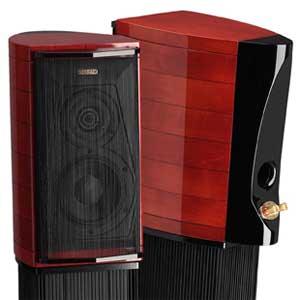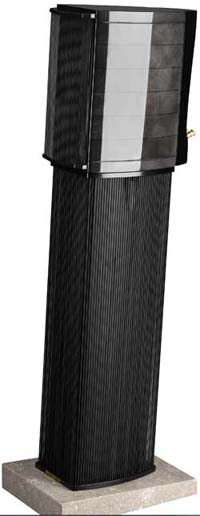| Italian Grace - Sonus
Faber's Guarneri Memento |
When it comes to culture,
style and tradition, it's hard to beat the Italians.
The loudspeakers under review here are ideal examples; I can't
think of another loudspeaker manufacturer that has taken the
time and effort to finish a product to the level of craftsmanship
and refinement seen here. The Guarneri Memento is named in
tribute to the art of the Cremonese violin makers of old, as
are the other family members of the Sonus faber Homage Series
of loudspeakers — the Amati Annicersario and the Stradivari
Homage.
Sonus faber, loosely translated from Latin as “handcrafted
sound,” was established in 1983 by a gentleman named
Franco Serblin. The company's philosophy has always been based
on a three-fold foundation: driver development, crossover theory
and cabinet design. Serblin continues to work as the company's
chief creative designer and this is likely the reason why the
industry regards Sf products as high-end, both in system design
and style.
Assembly & Appearance
The Sfs arrive in three large boxes containing the stands,
the Vicenca stone bases and a pair of speaker enclosures. Assembling
the speaker components wasn't difficult as bolts, washers and
allen key are supplied. A pair of WBT terminals point to single
wiring for these fine designs.
|
|
The enclosure finish is not only a work of art, as Sf states that
it also has a “profound effect” on the final sound — a
claim with which I agree as I researched this issue years ago.The
gorgeous finish is accomplished by first sealing the cabinets with
albumin to prevent the many layers of varnish from penetrating the
wood. At least 10 coats of varnish are applied and hand sanded before
the final polishing takes place. Sf employs a unique blend of organic
substances including Venetian larch turpentine, linseed oil, propolis,
wine alcohol, gamboges, copal gum and oliban in the finishing process.
All work is done manually and the result is a mirror-like finish
similar to that found on a violin. The Guarneri Mementos are available
in both a piano gloss “Red Violin” or gloss “Graphite” finish.
The grilles covering the baffles are unique as they are comprised
of a series of silk strings. Strings (made of elastomer wrapped in
silk) continue along the speaker stands, lending a well-finished,
pleasing flow to the overall motif.
Each enclosure is constructed of 36 individual sections of selected
solid maple in a constrained-mode damping arrangement designed to
cancel undesirable resonance. The interior (side) walls are damped
in specific areas with sheet copper, while small pieces of lead are
used to further tune each cabinet and prevent resonances. The cabinet's
visible sections are seamed with ebonized maple. The maple used for
the enclosures is naturally dried for two years and then stabilized
in kilns.
Each cabinet is hand-assembled using organic glue and heat-compression
procedures identical to those used centuries ago in the manufacture
of violins.
The Sound
As the SFs have an efficiency rating of 88dB, I concluded that some
amplifiers will not drive them to their full potential. This prompted
me to connect them first to Simaudio's reference system, the A-8
power amp, the P-8 preamp and the Andromeda CD player (all reviewed
in the last issue). This system combination resulted in very accurate
sound, but not what I'd call perfect, due to the lack of some upper
bass and high frequency harmonics. Some members of the listening
panel disagreed with my deduction-but I stand firm and you'll understand
why as you read on.
|
Enter, the Bryston 28B
SST monoblocks (reviewed in the last issue). Not only did this
1000 watts/channel solid state design drive the Fs with ease,
the sound took on weight, body, texture, dynamics, detail and
all the other good things reviewers (including this one) look
for in a synergistic system set-up. Note that the Brystons
are rated at 1000 watts with an 8-ohm load or 2000 watts into
a 4 ohm load, which is the Guarneri Memento's impedance rating.
To test the Sf's ability to cope with a variety of music,
I used classical, jazz, blues and rock'n roll albums. Cope
it did, although more successfully with some music than with
others. Classical music, including baroque ensembles and
string quartets, for example, was handled very well, clearly
revealing the timbre, or personality, of the instruments.
Large orchestral works — music
from Wagner, Beethoven, Rimsky-Korsakov and Tchaikovsky — really
brought the Guarneri Mementos to life and they managed dynamic
passages without constraint. Most impressive, although not
entirely evident with all amplifiers I tried, was the Bryston/Sonus
bass. It was rich, full-bodied and, though resolution suffered
somewhat below about 42Hz, it was very gratifying.
Thinking that my in-house single-ended Wyetech Labs Topaz amplifier
(reviewed in Vol.13, No.2) might do a reasonable job, I connected
it to the loudspeakers. BAM! I was right and, with this combination,
most of the missing harmonics were recovered. The 18 watts/channel
single-ended Topaz provided enough power to drive the loudspeakers
to about 110dB without flinching — that's enough volume
to disturb the neighbors and make your ears ring. The Topaz
did what it does best: harmonics, detail, smoothness and beautifully
executed tonal finesse. However, I wasn't entirely happy with
the sound, thinking that there must be still another amplifier
that could heighten the all-round performance even more. And
there was.
The Guarneri Mementos perform remarkably well when driven hard, with volume levels
up to 115dB. That's enough to recreate sound pressure levels comparable to a
live rock concert or a large orchestral arrangement with kettle drums, cannon
shots and the kitchen sink. At lower volumes, the Guarneri Mementos sound well
tempered and relaxed; easy on the ears. The overall voice of the loudspeakers
is soft and subdued, never in your face even with driving dynamic musical program
material; yet, musical spirit is maintained.
One note about the grilles: as they consist of small silk strings, they can,
and will, resonate ever-so-slightly at high volumes and I recommend removing
them on those occasions. However, the resonances are inaudible at low volume
levels. |
Synopsis & Commentary:
Although it may take patience, the most important issue is to find
the type of amplification that suits the loudspeaker and personal
taste. As you can see, I have tried to “extract” the
best sound from the Sonus fabers by seeking a synergistic coupling
with other components. If you follow my system recommendation, you
will get what I consider the best sound. I realize that my opinion
may be construed as subjective, and others may not agree. However,
I think I have a good understanding of high-end audio and, as I regard
synergy as a primary concern for achieving the best possible performance,
I selected well-matched components and took great care in the system
set-up.
I trust that the North American distributor is cognizant of the importance
of choosing dealers who are qualified to accomplish the task of matching
components. However, even the “qualified” sometimes fail
to offer the best system solutions as they can only use components
they sell. I sell no components and I have a number of amplifiers,
cables and source components in-house with which to experiment. Based
on this, a very time consuming process, I envision a logical and,
hopefully, a synergistic amplifier match.
I believe that most single-ended vacuum tube amps will not drive
the Sfs, but if you have one already, I recommend you take it to
the dealer and test how it handles 88dB sensitivity — some
will (like the Wyetech Labs Topaz), many won't. Any powerful solid
state amp (around 100 watts/channel) will do the job. However, more
powerful ones, such as the Bryston 28B SST, will result in significantly
better control of bass frequencies, clearer midrange and greater
body to the music. The Bryston monoblock amps provide a stunning
image when coupled with the Sonus fabers, and they will never run
out of steam. If tube gear is your passion, you will have to find
a high-current amp with beefy power supplies that delivers loads
of voltage to the speaker terminals.
In my final reflections I'd like to connect the Guarneri Memento's
sound quality to their appearance. These speakers simply cannot be
ignored either by listeners or by interior decorators. They sound
great, they look great and they will affirm their proud owner's concern
for music and style.
Footnote
Guarneri — for whom the model under review is named — was
a pupil of Nicolo Amati, the famous violin maker (1596-1684). The
founder of the Cremona school was Andrea Amati who lived from 1520
to 1578 and whose earliest violins date from c.1564. His labels bore
the name Amadus and he is credited with the basic design of the modern
violin. His sons were Antonio Amati and Girolamo or Geronimo Amati,
who worked together and closely followed their father's patterns
in making violins of graceful shape and sweet tone with a characteristic
amber-coloured varnish finish. Nicolo Amati, son of Girolamo, brought
the Amati violin to its height after 1645. Among Nicolo's other pupils
was another great violin maker, Antonio Stradivari.
| MODELS |
MANUFACTURER |
| Guameri Memento |
Sonus Faber |
| RATING |
CONTACT |
♪♪♪♪
|
in North America:
Sumiko2431 Fifth St.,
Berkeley, CA 94710
(510) 843-4500
www.sumikoaudio.net |
| PRICE |
|
$15.995.00 CDN
$12,995.00 US |
|
| Dimensions |
Weight |
15” (h) 8.25” (w) 15.25” (d)
Speaker
and stands:
48.5” (h) 12” (w) 15.75” (d) |
187.5 lbs/pr |
|
 |
TECHNOLOGY:
The enclosure design of the Guarneri Memento is incredible,
creating a nearly resonance-free environment for the driver
complement. I verified this with the help of a pair of high-end
stethoscopes that include positions for high and low frequencies.
This revealed cabinet integrity second to none.
I mentioned the immaculate finish in the body of the review,
but I'd like to add here that it contributes to the overall
sound, avoiding stray reflections from the body of the cabinets,
thereby allowing an unobstructed sound wave path. (I actually
tested this years ago with a pair of equally well-finished
loudspeakers).
The Guarneri Memento is a two-way system featuring a six-inch
midrange/woofer and a one-inch tweeter.
A small port located on the narrow rear section of the enclosure
makes the speaker a bass reflex design which takes the back
wave from the driver and couples it (in phase with the front
wave) to the outside air. In large enclosures this translates
to higher efficiency, whereas in small enclosures, such as
those under review, efficiency is kept rather low.
The Sonus faber-designed bass/midrange driver is unique in
its ability to handle dynamics and provide proper linearity.
The tweeter has extraordinary excursion linearity and boasts
a ring radiator with a dual wave guide to assure proper dispersion.
The crossover point is 2.5kHz, operating at 6dB per octave.
Frequency response is quoted from 39Hz to 30kHz; impedance
is four ohms nominal; sensitivity is 88dB SPL, 2.83V/1m.
Although power handling is quoted from 30 watts to 200 watts,
the Sfs can handle much more power and I recommend at least
100 watts to get these babies to sing. Advances in metallurgy
have led Sonus faber to adopt a structured silver-palladium
alloy on all connector conductors to provide a totally
coherent signal path. |
|


